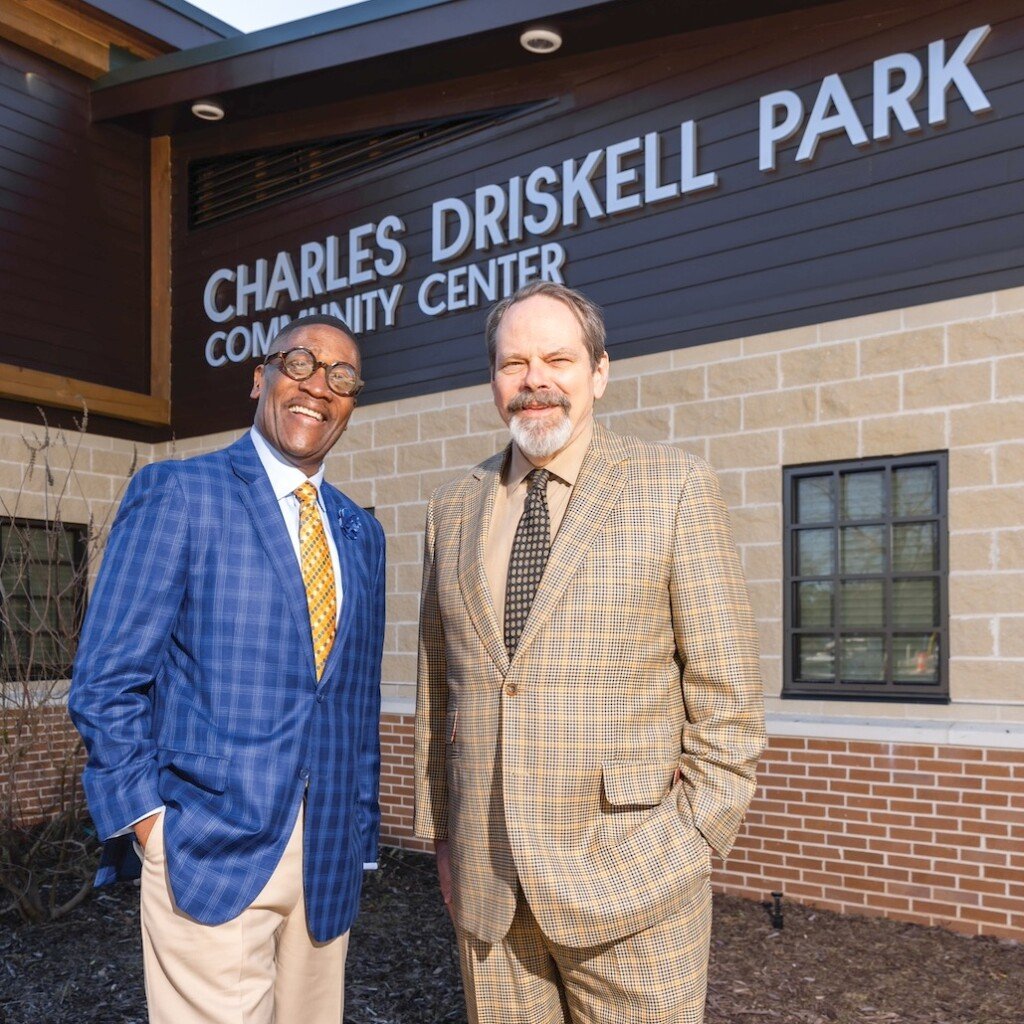Rolling in the Green
While the Masters is Georgia’s biggest golf event, weekend and everyday players schedule tee times throughout the year, bringing big bucks to the state.

Surging Popularity: Georgia State Golf Association CEO Matt Vanderpool at the Bobby Jones Golf Course in Atlanta. Photo credit: Kevin Garrett
When Scottie Scheffler finished at 11-under 277 to win this year’s Masters Tournament, he received a record $3.6 million cash prize, a gold medal, a sterling silver replica of the Masters trophy, and, of course, the green jacket – his second in three years.
But Scheffler wasn’t the only winner in the weeklong tournament, for which 2 million golf fans vied for a limited number of spots to witness the event firsthand. While 89 golfers competed in the 91st Masters, an estimated 90,000 patrons traveled to Augusta to watch and cheer them on – quietly, of course. When they did, they boosted the local economy by staying in hotels, dining in restaurants, renting cars and homes, and purchasing a variety of items, from snacks and beverages to gasoline and licensed merchandise.
“The positive impact of Masters Week is felt across all sectors of our economy,” says Bennish Brown, president and CEO of Destination Augusta. “For some businesses, the Masters is like a 13th month of revenue wrapped up in a single week.”
An Economic Driver

A World-class Sport: Reynolds Lake Oconee, one of the largest golf resorts in the U.S.. Photo credit: contributed
While the Masters comes but once a year, golfing is a year-round obsession in Georgia, contributing substantially to the state’s economy. “The golf industry in Georgia supports over 55,000 jobs, $2.7 billion in wage income, approximately $1.5 billion in tourism and a total economic impact of $5.3 billion,” says Matt Vanderpool, CEO of the Georgia State Golf Association (GSGA).
Professional and charitable events, highlighted by the Masters and the PGA TOUR Championship held each August at Atlanta’s East Lake Golf Club, contributed a combined $273 million and supported 3,200 jobs in 2022, according to The Economic Report of Georgia’s Golf Industry, sponsored in part by GSGA and published in February 2024. But it’s the everyday mid- and high-handicappers – and even the duffers – who are responsible for the majority of golf’s impact. Georgia is home to 680,000 in-state golfers, 170,000 of whom play 25-plus rounds annually. The golf business here serves both local and visiting golfers through a variety of ways, with facilities selling rounds and memberships leading the way, says Vanderpool.
Georgia’s 362 golf facilities with 6,500 holes collectively contributed $1.1 billion in direct economic output, representing 35% of the state’s golf economy, according to the economic report.
From public courses to historic private clubs and resorts offering multiple courses and other amenities, Georgia has something to offer golf enthusiasts of almost any level of income, skill and passion for the sport. Many courses draw players from around the U.S. and throughout the world.
Reynolds Lake Oconee: One of the largest golf resorts in the U.S. lies midway between Augusta and Atlanta on 12,000 acres along Lake Oconee in Eatonton. Reynolds Lake Oconee features six courses, each uniquely designed by legendary architects, including the Jack Nicklaus-designed Great Waters and the Tom Fazio-designed National. A seventh course, another Fazio design, will open soon. In addition to golf, members have access to marinas, a world-class culinary program, wellness facilities including tennis and pickleball courts, multiple fitness centers, sporting clays, off-road driving experiences at Sandy Creek Sporting Grounds, and year-round social and cultural events, says Tim Hong, COO at Reynolds Lake Oconee.
“While the club is primarily member-focused, invited guests of The Ritz-Carlton Reynolds, Lake Oconee, and guests of our cottage program can also enjoy selected golf courses and restaurants,” Hong says. Last year, Reynolds hosted nearly 200,000 rounds, with most golfers coming from Georgia and the Southeast. Reynolds Lake Oconee has over 1,000 employees, making it the largest private employer in the Lake Oconee region.

Historic Course: East Lake Golf Club hosts the PGA TOUR Championship each August. Photo credit: Evan Schiller
East Lake Golf Club: Just east of downtown Atlanta is East Lake Golf Club, the oldest golf course in the city and where the legendary Bobby Jones won his first tournament at age 6.
East Lake, which has 75 regular full-time employees and hires a large number of seasonal employees, is not only historic but philanthropic as well, says Chad Parker, president and general manager. He notes that proceeds from club operations support several charitable partners, including the East Lake Foundation. The club and the foundation were instrumental in transforming the notoriously derelict East Lake Meadows public housing project into “a thriving community,” says Parker, with mixed-income housing, a YMCA and a charter school.
Beginning immediately after last year’s TOUR Championship, the club began planned renovations of the course and practice facilities that included addressing course infrastructure needs, analyzing current course design elements and creating a golf setting that is memorable, challenging and enjoyable for all levels of play, Parker says. The project will be completed by the time the club hosts the TOUR Championship in August.
Bobby Jones Golf Course: In 1932, two years after Jones became the only golfer to ever win all four major championships in a single calendar year, the city of Atlanta opened an 18-hole course named in his honor. Built at the site of the Civil War’s Battle of Peachtree Creek, the Bobby Jones Golf Course was “jammed into” a 128-acre site that was otherwise undevelopable due to potential flooding, says John Sorrells, Bobby Jones Golf Course Foundation director.
The course had been run (though not always meticulously) by the city of Atlanta for 84 years when the state of Georgia acquired the property through a land swap. That’s when a group of citizens who shared a passion for Jones’ legacy formed the Bobby Jones Golf Foundation and leased the land from the state. After raising $35 million, the foundation “blew up what existed” and transformed the course into one that honors the man and the golfer by bringing the game to three groups close to his heart: children, veterans and the disabled, says Sorrells.

Honoring a Legend: John Sorrells, director of the Bobby Jones Golf Course Foundation, at the Georgia Golf Hall of Fame, which features a permanent exhibit celebrating the nine-time USGA champion. Photo credit: Daemon Baizon
In 2018, the course reopened with a one-of-a-kind design that fits its urban setting, which basically is two championship nine-hole courses right on top of each other, say Sorrells. “When played in coordination, you can go out one way, stop and turn around, and play the other nine holes. It’s a reversible course,” he says. The redesign allowed room for a driving range – the only one inside the Atlanta perimeter – a putting green and a golf academy that teaches the game to children as young as 3.
Since reopening, the nonprofit course has taught 5,500 golf lessons to juniors, men and women of all ages; hosted 4,500 children in camps, clinics and individual lessons; and graduated 250 veterans from the PGA HOPE program, a six-week program where veterans get weekly counseling and learn the game of golf.
“Our core purpose is to make a difference in people’s lives, in the way we teach the game of golf and the way people perceive the game of golf,” says Sorrells. “It is no longer to be perceived as a rich white man’s sport. It is available to anyone at Bobby Jones. It’s a public course where anyone can play.”
Beyond Courses and Competitions
Courses and competitions aren’t Georgia’s only contribution to the golf world. Approximately 95% of all motorized golf carts in the world are built in Georgia, primarily by Club Car in Evans and Textron, which builds E-Z-GO, Cushman and Jacobsen brand golf carts in Augusta. Two major club and ball manufacturers, Bridgestone and Mizuno, also have manufacturing plants in Georgia.
Georgia-based companies also keep courses green, including Dalton-based Tour Greens, which designs, installs and manufactures synthetic putting greens. In addition, Atlas Turf International in LaGrange provides turf grasses for resort facilities, private and public clubs, and many world-famous championship venues around the globe.
Overall, the manufacture of golf carts, equipment, balls and related items yielded a direct economic contribution of $679 million, with a total economic impact nearing $1.1 billion, according to the golf industry report.

Golf’s Greatest: Scottie Scheffler celebrates winning the 2024 Masters Tournament at Augusta National Golf Club this past April. Photo credit: Masters Tournament
Popularity and Participation Are Growing
While Georgians’ love of golf has existed for almost as long as the state itself, the sport’s popularity surged during the pandemic when people sought out activities that allowed social distancing. In 2022, golfers from in and out of the state enjoyed approximately 11.7 million rounds at Georgia’s golf facilities, marking a notable 20% increase from the 9.7 million rounds played in 2019. “The COVID pandemic brought millions of new golfers to the game as well as millions of lapsed golfers back to the game. Many of these have continued to play golf, which has increased the number of rounds played not only in Georgia but nationally in the last four years,” Vanderpool says.
Adding to the popularity of golf has been the “growth of off-course venues like TopGolf, Drive Shack and the like,” says Vanderpool. “And the continued popularity of these locations shows that golf is appealing to a broader audience.” It’s a trend Vanderpool hopes and expects will continue.
GSGA and other organizations, including the Bobby Jones Golf Course Foundation, are working to provide training and promote participation among people with disabilities and children, improving accessibility for all and ensuring the game stays strong for generations to come.







